|
|
As the owner of a WordPress agency for over 10 years, I’ve purchased tons of different plugins and themes. Every single time, I’ve analyzed their reviews before making the purchase. This practice has probably saved me and my team hundreds of hours over the years avoiding problems that users mention in reviews.
Personally, I’ve only ever purchased products that have more than 4 stars, and if the only available product has less than 4 stars, I might reluctantly give it a try, expecting little. I’ve learned that many other WordPress users often think or feel similarly. So, the question is: How do you get the best possible reviews and testimonials and encourage more users to try or buy your product?
Why are Public Reviews & Testimonials so Important?
You may have a great product and great marketing, but the opinions of others hold a lot of weight in the minds of your users. In fact, 88% of consumers have reported that they trust online reviews as much as recommendations from their family or friends.
So, here’s a few key reasons why reviews and testimonials provide a lot of value to your business:
- Including a review or testimonial in the right locations (like the checkout process) may convince users that they’re making the right decision at the critical time – increasing your conversion rates.
- Public feedback from other people has a strong psychological impact on your customers in the form of social proof.
- Additionally, because the WordPress space has historically been known as a risky ecosystem for buying plugins and themes due to the fact that developers have disappeared and stopped supporting their products. Displaying positive customer feedback on your site can help your business overcome the stigma that many buyers in the WordPress space have from this rocky past.
What’s the Difference between Reviews and Testimonials?
Reviews and testimonials come in many forms, and I should first highlight the difference between these two types of customer feedback.
Testimonials are most often collected and curated by business owners to positively shed light on different parts of the business, product, or service. Testimonials should be taken with a grain of salt by customers because, while the words may be true, they are ultimately approved by the business owner.
Reviews, on the other hand, are generally collected by a 3rd party, without the business being involved in the process. Reviews provide value to customers because they tend to be raw and unfiltered and show honest opinions that other customers have.
Review Examples
Sites such as WordPress.org and ThemeForest offer the option to leave reviews, like the one below.
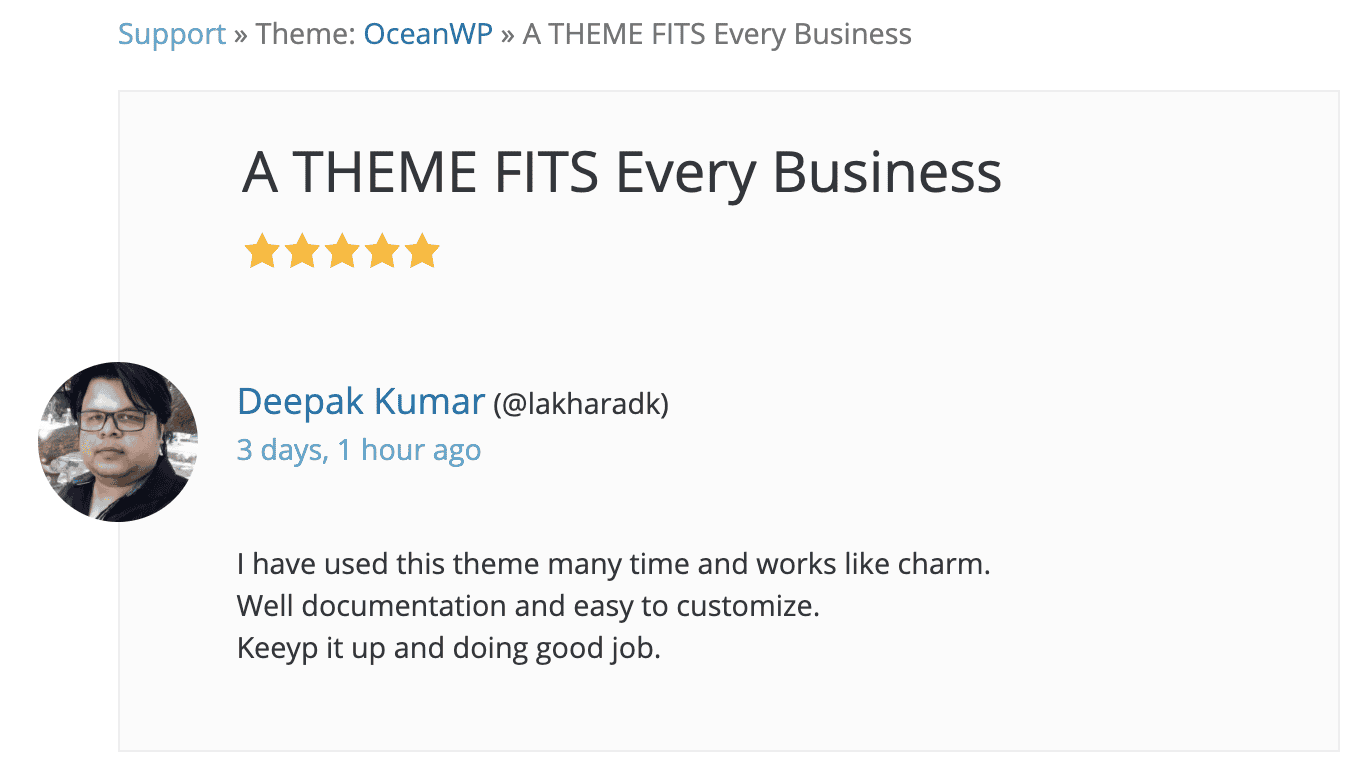
Typically, they allow filtering of reviews, so customers have easy access to the full picture about the product they’re considering.
How often have you seen a product on WordPress.org and clicked to check the 1-star reviews? Well, it doesn’t always paint the prettiest picture…
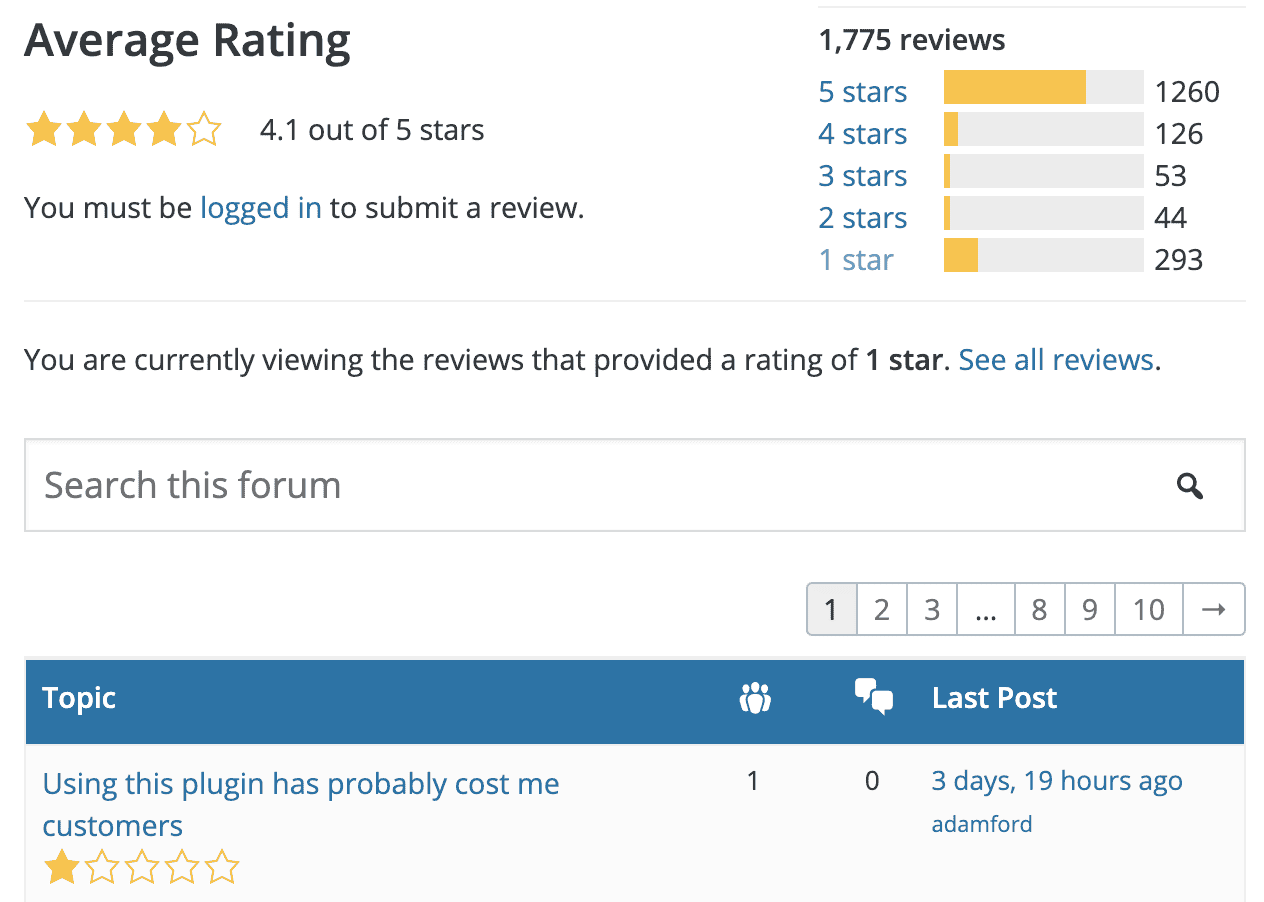
Marketplaces use “verified reviews”, which typically include a “badge” that indicates the reviewer is someone who has genuinely purchased the product and interacted with it in some way.
WordPress marketplaces tend not to display the verified badge because it’s assumed that the reviews can only be left by purchasers of the product, so here’s an example from Amazon that includes the mention:
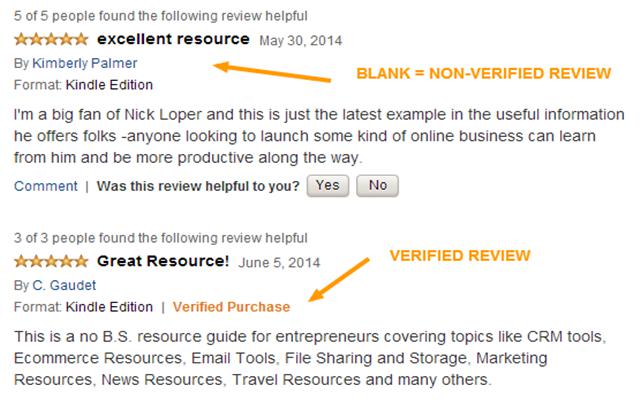
Testimonial Examples
This testimonial about OceanWP below is a great example that discusses the product positively, and includes a photo, which increases legitimacy and makes it more personal. It’s these kind of well written testimonials that I would typically look at as the buyer of a product for my agency.
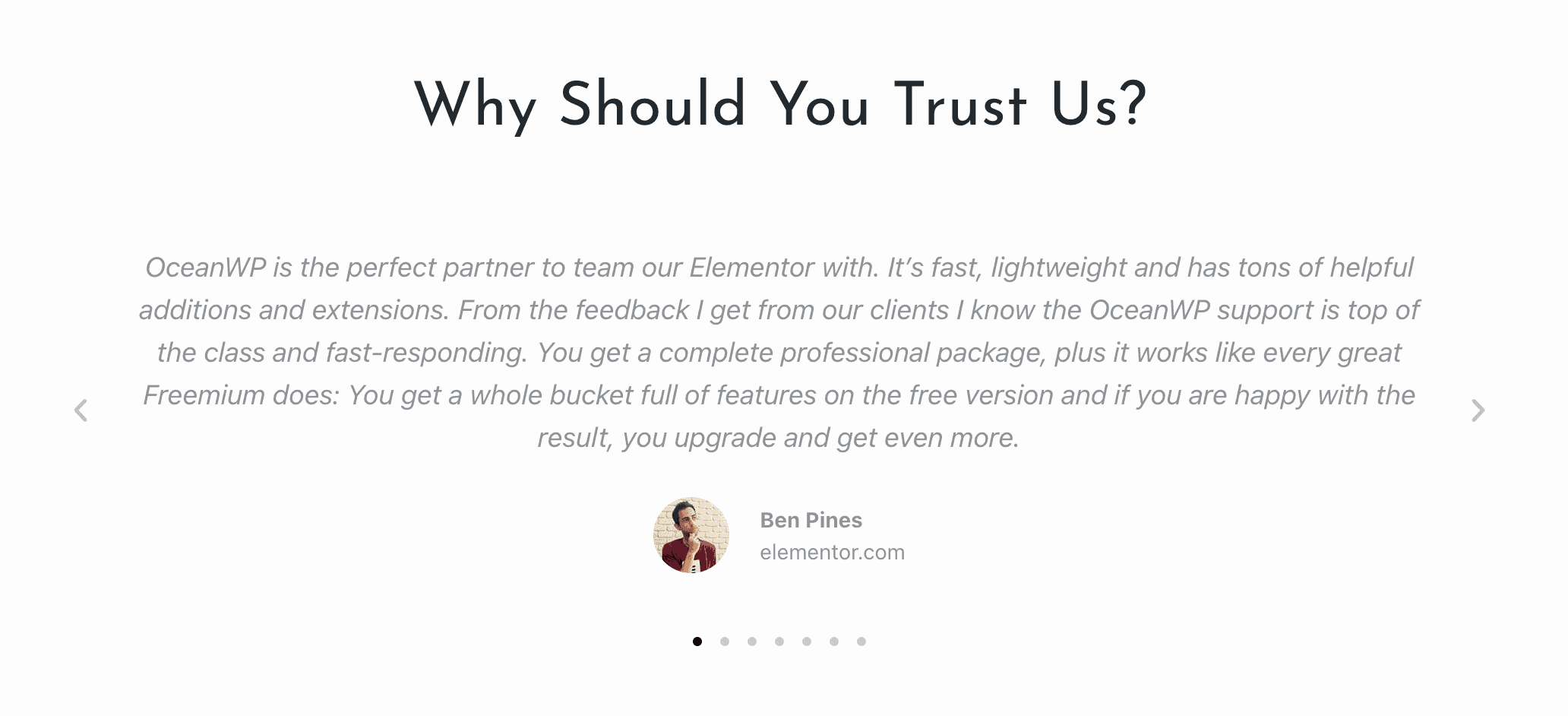
Here’s another good example from WP Simple Giveaways that talks about a specific feature as well as great service:

How to Collect Testimonials and Reviews for WordPress Products?
It’s not just about creating a good user experience and offering seamless functionality built into your product – it’s about connecting with your users and helping them share their good experiences with you and other potential customers.
Here are some common ways to grab those endorsements for your plugins or themes.
Asking an individual person
Asking a friend, a connection in your network, or CEO of a company to test your product and give their feedback. By crafting a unique email tailored specifically to that person, they may be willing to give your product that juicy recommendation you’re looking for if they liked the experience.
Asking Beta users
If your users are willing to test out the beta version, it usually means they’re more open to give feedback if you ask them for it.
Asking your email list
Asking your email subscribers to give your product a recommendation if they were satisfied with it can often provide good results. Since emails are private, more people may be comfortable giving you and your product a piece of their mind.
During customer support interactions
When you’re engaging with customers while providing support, you can always ask for a review or testimonial if your customers are happy with the experience. Depending on how committed they are, which you can gauge based on your interactions with them, you may even go as far as asking them to log in to WordPress.org and leave you a review of the product directly on there.
Automated after purchase review request
eCommerce marketing platforms like Yotpo manage to significantly increase the number of reviews they capture for the businesses working with them. Their secret is shockingly simple, yet super effective. They automatically send a review request email a few days after a purchase.
Their secret sauce is embedding the review form right into the email, allowing customers to submit an entire review without leaving their mailbox. Yes! You can do that with emails (to some extent).
At Freemius, we optimized the process even further, specifically for the plugins and themes ecosystem. The review request email is triggered a week after purchase and only to customers that actually activated their license and are still using the product. This approach avoids awkward situations of accidentally asking people to review before they have had the chance to try the product, or perhaps they have already uninstalled it and asked for a refund.
Here’s what a review request email looks like:
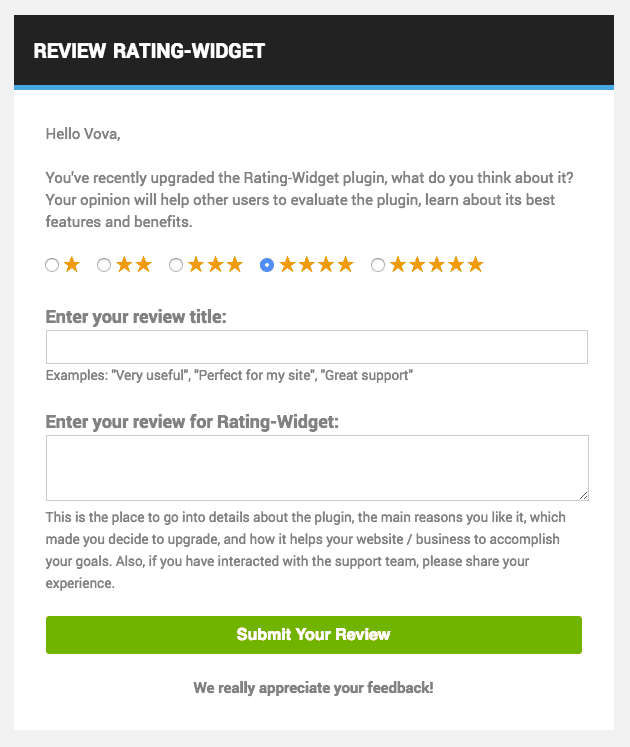
If the user doesn’t complete the entire review directly in their email, the submit button will open an online review form for them to finalize the submission:
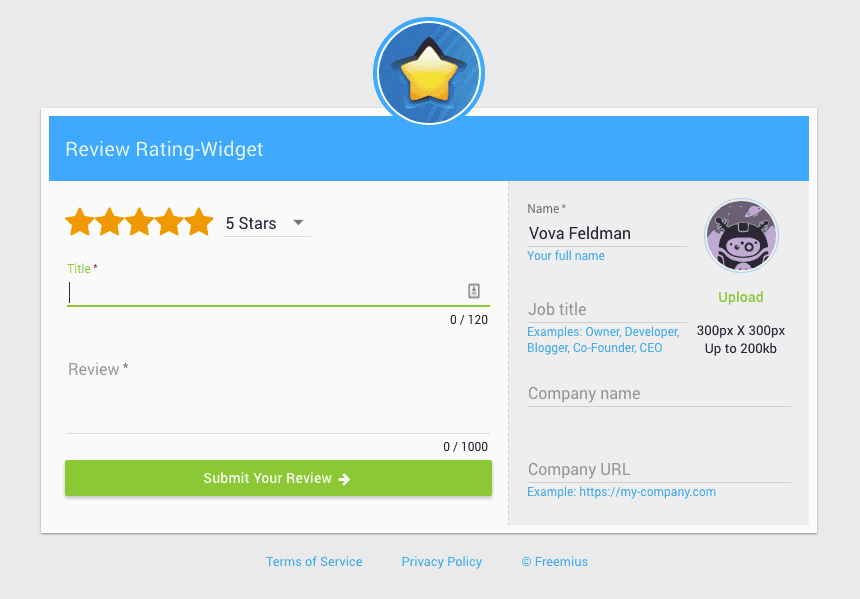
Automating and testing your strategy
You can automate your review collection strategy with different triggers based on how your customers interact with your product and ask for a review right within the WP Admin using a friendly admin notice. Our CEO, Vova, has covered this technique in depth in the following article:
https://freemius.com/blog/how-we-increase-our-wordpress-plugin-reviews-by-700-percent/
This tactic has helped many businesses like NextGEN Gallery to take their reviews “game” to the next level.
How to Choose which Reviews and Testimonials to Feature?
Not all reviews and testimonials are created equal. There are a few factors to look at when asking customers for feedback or curating testimonials for different locations on your site. What makes them stand out is being authentic and specific.
Authenticity
The commenter should be honest, describing both the pros and cons of the product. Though testimonials may often be curated by product sellers, if they are well-rounded and mention a point of contention that the user experienced, they will provide more value to potential customers. Here’s a good example that mentions the plugin sellers’ name as well as some special adjustments needed in their case:
![]()
Specificality
Well-written testimonials should be at least 2-3 sentences describing the product in detail. Short testimonials, such as “Great product!” don’t really help consumers make better purchasing decisions. These kinds of testimonials do not describe what makes the product great, what makes it good, or any pros/cons it may have. Shorter comments like this are better suited to reviews where a star rating can share more information.
Longer testimonials that go a bit more in-depth and mention specific details about the product gives buyers a lot more information to go on.
The extent and length of the testimonials from Tickera’s site are a great example:
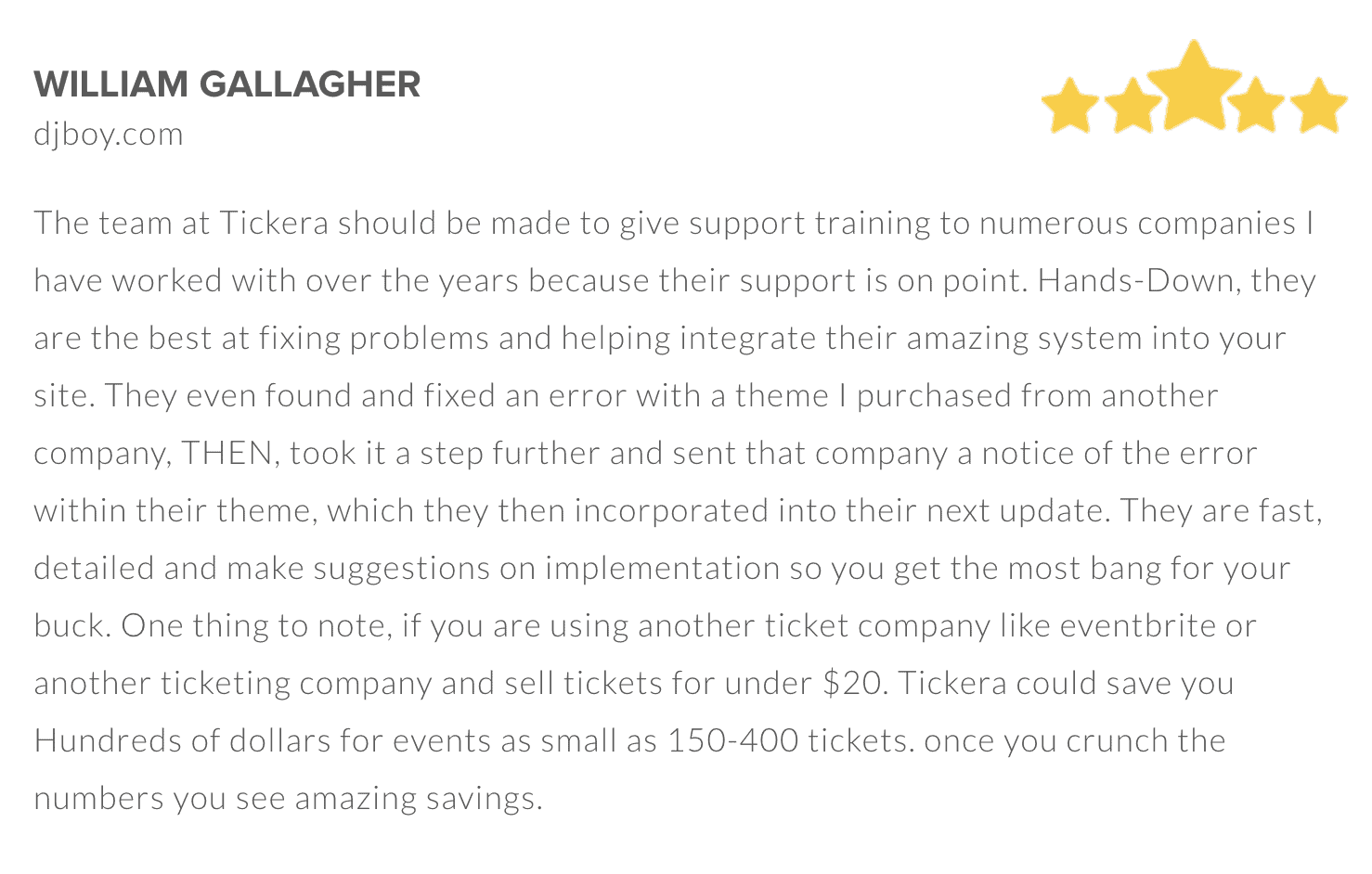
Where should you Use Reviews and Testimonials?
Now that you’ve collected some great testimonials, you’ll need to use them strategically in order to increase your conversion rates and sales, so let’s go into the best ways to place them.
Homepage
Testimonials are commonly used on a company’s homepage. A major reason is that newcomers to a company’s site often ask questions such as “Is this company legit?” and “Can I trust this company’s products?”
By seeing several testimonials from real people, it makes a brand a lot more trustworthy right upfront.
Point of contention
When you’re selling an expensive WordPress plugin or theme, naturally, some may question the high price. These naysayers may argue that your product is not worth the price, or that they can find a similar product at a much cheaper rate. By using a testimonial on the pricing page, the endorsement can alleviate fears from skeptics that they’re being ripped-off.
An email opt-in
People are hesitant to give out their email address, especially if they don’t fully trust a brand. Two common ways to overcome skeptical newcomers: A lead magnet (such as a free e-book or checklist) or a glowing testimonial.
Social media profiles
Social media is one of the most trendy mediums where reviews are posted. If you don’t already have a Facebook page for your product or brand name, you can start collecting reviews directly on the page itself in no-time.
If people see enough great reviews of a product, it will be automatically viewed as trustworthy, as people will naturally gravitate towards products with a lot of positive reviews.
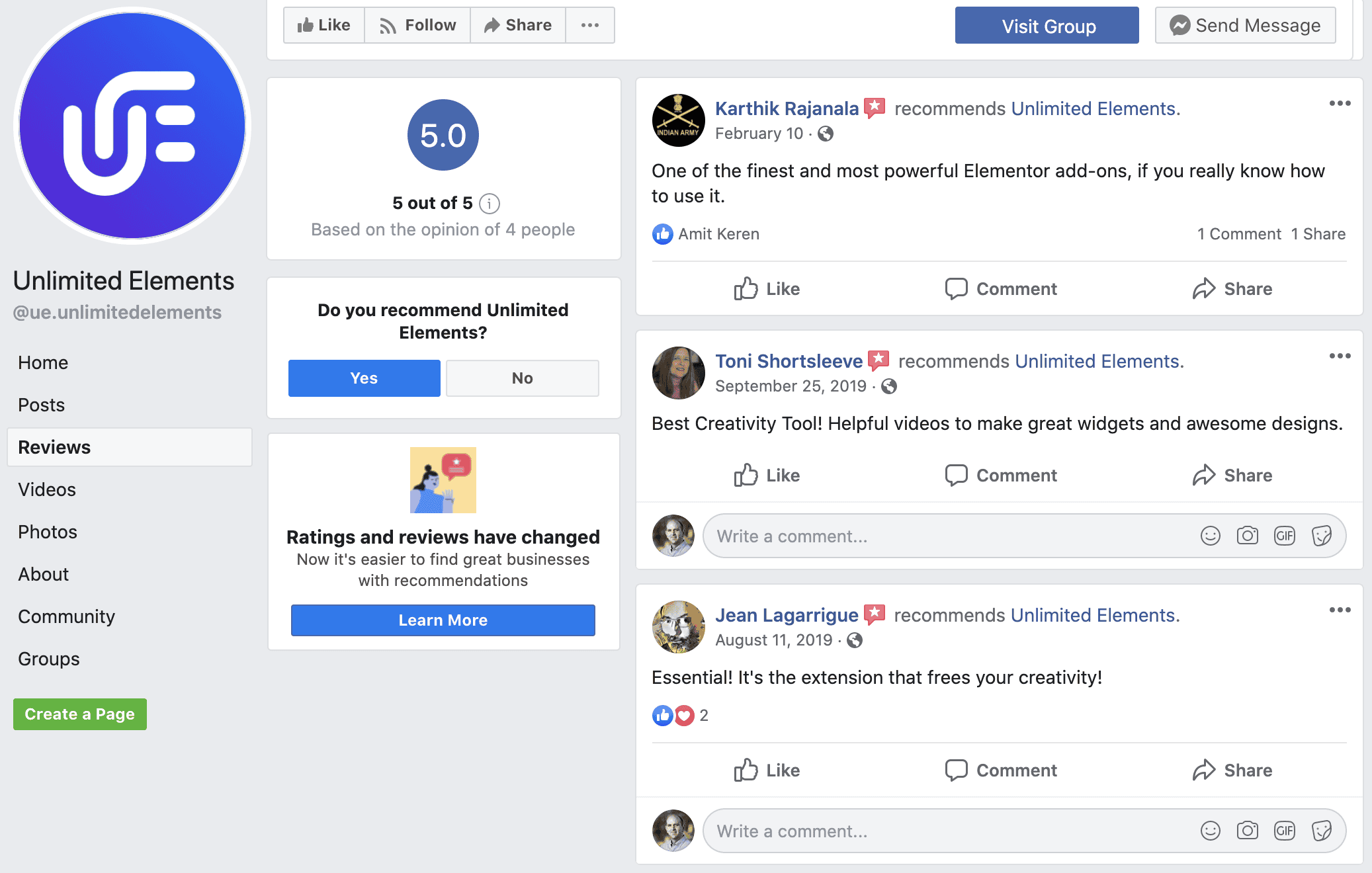
Wrapping it Up
When selling plugins and themes, it’s not just the quality that matters. Often, whether a product succeeds or fails in getting sales comes down to showing immediate trust and value to potential buyers. With positive feedback from customers, a company can provide that essential trust and value from day one in all their marketing efforts.
With contributions from Jason Yu.









Hey Everyone! This is shameless self-promotion :) My WP Review Slider Pro plugin now allows you to easily download your Wordpress.org plugin and theme reviews along with Freemius reviews using the Freemius API and show them off on your site.
Thanks!
Josh
https://wpreviewslider.com/